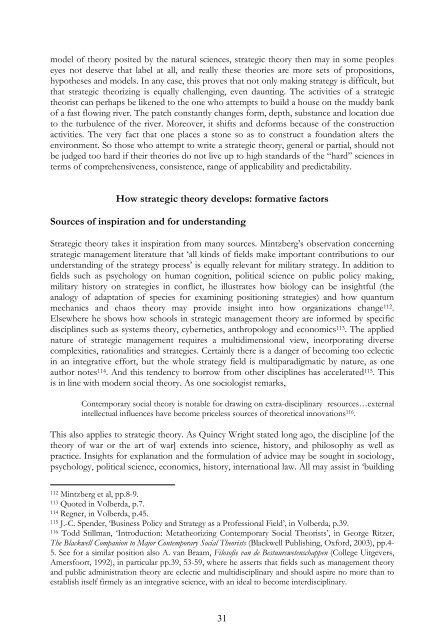Science, Strategy and War The Strategic Theory of ... - Boekje Pienter
Science, Strategy and War The Strategic Theory of ... - Boekje Pienter
Science, Strategy and War The Strategic Theory of ... - Boekje Pienter
Create successful ePaper yourself
Turn your PDF publications into a flip-book with our unique Google optimized e-Paper software.
model <strong>of</strong> theory posited by the natural sciences, strategic theory then may in some peopleseyes not deserve that label at all, <strong>and</strong> really these theories are more sets <strong>of</strong> propositions,hypotheses <strong>and</strong> models. In any case, this proves that not only making strategy is difficult, butthat strategic theorizing is equally challenging, even daunting. <strong>The</strong> activities <strong>of</strong> a strategictheorist can perhaps be likened to the one who attempts to build a house on the muddy bank<strong>of</strong> a fast flowing river. <strong>The</strong> patch constantly changes form, depth, substance <strong>and</strong> location dueto the turbulence <strong>of</strong> the river. Moreover, it shifts <strong>and</strong> deforms because <strong>of</strong> the constructionactivities. <strong>The</strong> very fact that one places a stone so as to construct a foundation alters theenvironment. So those who attempt to write a strategic theory, general or partial, should notbe judged too hard if their theories do not live up to high st<strong>and</strong>ards <strong>of</strong> the “hard” sciences interms <strong>of</strong> comprehensiveness, consistence, range <strong>of</strong> applicability <strong>and</strong> predictability.How strategic theory develops: formative factorsSources <strong>of</strong> inspiration <strong>and</strong> for underst<strong>and</strong>ing<strong>Strategic</strong> theory takes it inspiration from many sources. Mintzberg’s observation concerningstrategic management literature that ‘all kinds <strong>of</strong> fields make important contributions to ourunderst<strong>and</strong>ing <strong>of</strong> the strategy process’ is equally relevant for military strategy. In addition t<strong>of</strong>ields such as psychology on human cognition, political science on public policy making,military history on strategies in conflict, he illustrates how biology can be insightful (theanalogy <strong>of</strong> adaptation <strong>of</strong> species for examining positioning strategies) <strong>and</strong> how quantummechanics <strong>and</strong> chaos theory may provide insight into how organizations change 112 .Elsewhere he shows how schools in strategic management theory are informed by specificdisciplines such as systems theory, cybernetics, anthropology <strong>and</strong> economics 113 . <strong>The</strong> appliednature <strong>of</strong> strategic management requires a multidimensional view, incorporating diversecomplexities, rationalities <strong>and</strong> strategies. Certainly there is a danger <strong>of</strong> becoming too eclecticin an integrative effort, but the whole strategy field is multiparadigmatic by nature, as oneauthor notes 114 . And this tendency to borrow from other disciplines has accelerated 115 . Thisis in line with modern social theory. As one sociologist remarks,Contemporary social theory is notable for drawing on extra-disciplinary resources…externalintellectual influences have become priceless sources <strong>of</strong> theoretical innovations 116 .This also applies to strategic theory. As Quincy Wright stated long ago, the discipline [<strong>of</strong> thetheory <strong>of</strong> war or the art <strong>of</strong> war] extends into science, history, <strong>and</strong> philosophy as well aspractice. Insights for explanation <strong>and</strong> the formulation <strong>of</strong> advice may be sought in sociology,psychology, political science, economics, history, international law. All may assist in ‘building112 Mintzberg et al, pp.8-9.113 Quoted in Volberda, p.7.114 Regner, in Volberda, p.45.115 J.-C. Spender, ‘Business Policy <strong>and</strong> <strong>Strategy</strong> as a Pr<strong>of</strong>essional Field’, in Volberda, p.39.116 Todd Stillman, ‘Introduction: Metatheorizing Contemporary Social <strong>The</strong>orists’, in George Ritzer,<strong>The</strong> Blackwell Companion to Major Contemporary Social <strong>The</strong>orists (Blackwell Publishing, Oxford, 2003), pp.4-5. See for a similar position also A. van Braam, Filos<strong>of</strong>ie van de Bestuurswetenschappen (College Uitgevers,Amersfoort, 1992), in particular pp.39, 53-59, where he asserts that fields such as management theory<strong>and</strong> public administration theory are eclectic <strong>and</strong> multidisciplinary <strong>and</strong> should aspire no more than toestablish itself firmely as an integrative science, with an ideal to become interdisciplinary.31
















